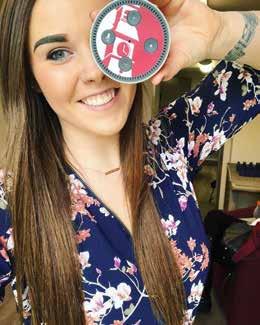
3 minute read
“Alexa, ask Park…”
"Alexa, ask Park…"
• What are my grades?
Advertisement
• How do I apply for scholarships?
• When is the next home game?
• How can I get involved in the alumni association?
• What’s happening today?
These are just a few of the more than 400 questions and commands that Amazon’s virtual assistant, Alexa, can answer about Park University in the new “Ask Park” application launched last year.
The voice-command service — used with various Alexa devices often shaped like a cylinder or hockey puck — is making it easier for the Park family to stay connected hands-free — without the need of a traditional computer keyboard or touch device.
The idea for “Ask Park” was sparked by the creative thinking of James Nelson, associate vice president of information technology services, and Jared Flaherty, director of learning management systems support. The two were introduced to Alexa technology for educational institutions during a 2017 national conference presented by Canvas, a learning management platform.
With Park’s cultural mindset that embraces innovation, Nelson and Flaherty set out to discover ways to expand and integrate the emerging technology to enhance the Park experience.
“We saw the opportunity to experiment with natural language processing. By designing Alexa skills in-house, we’ve been able to customize how students and faculty can more quickly find answers to Park-related information,” Nelson said. With students and faculty at 42 campuses across the country and online worldwide, Park was one of the first colleges/universities of its size to use Alexa technology.
Faster and easier
Users can find fast answers to frequently asked questions about Park simply by saying, “Alexa, ask Park…” A complete list of categories and sample questions are available at park.edu/alexa.
“It’s all about convenience and making things faster and easier,” Nelson said. “Rather than having to call and wait on hold or send an e-mail and wait however long it takes to get a response, this technology can instantly answer many basic questions.”
Students have the option to link their Park ID number to the application to find personalized answers to questions such as “What homework is due this week,” or “What is my GPA?”
Since its launch in April 2018, more than 4,500 Park students, faculty and staff are using “Ask Park” and the number of users grows by double digits every month, Nelson said. It’s also impacting student engagement. “Twenty-five percent of our students tell us they attended a Park event they wouldn’t have otherwise gone to if they hadn’t heard about it through Alexa,” he said.
Ahead of the curve
Nelson said the application is available to everyone; users do not have to be a Park student to utilize the app. In fact, it is designed to be useful for prospective Park students.
For example, military service members and veterans often want to know how much college course credit their service experience could earn. “They can simply say, ‘Alexa, ask Park how much credit I can get for my military experience’ and they will be guided through questions about their military branch and rank,” he said. “Based on data we’ve collected, ‘Ask Park’ can tell them approximately how much transfer credit they could receive.”
Security has always been a priority for Park. “From the beginning, we designed it to be 100 percent FERPA compliant,” Nelson said, referring to the Family Educational Rights and Privacy Act, a law designed to protect sensitive student information. Students, faculty and staff cannot access any private information without first authenticating who they are through a secondary device. Users are also able to lock commands that would retrieve personal information.
“People are increasingly expecting instant access to information,” he said. “Just as today’s college students now expect services to be compatible with their mobile devices, the next generation of students will expect voice-command technology. With Park’s in-house capabilities, we’re learning what works and what doesn’t to help us stay ahead of the curve.”











